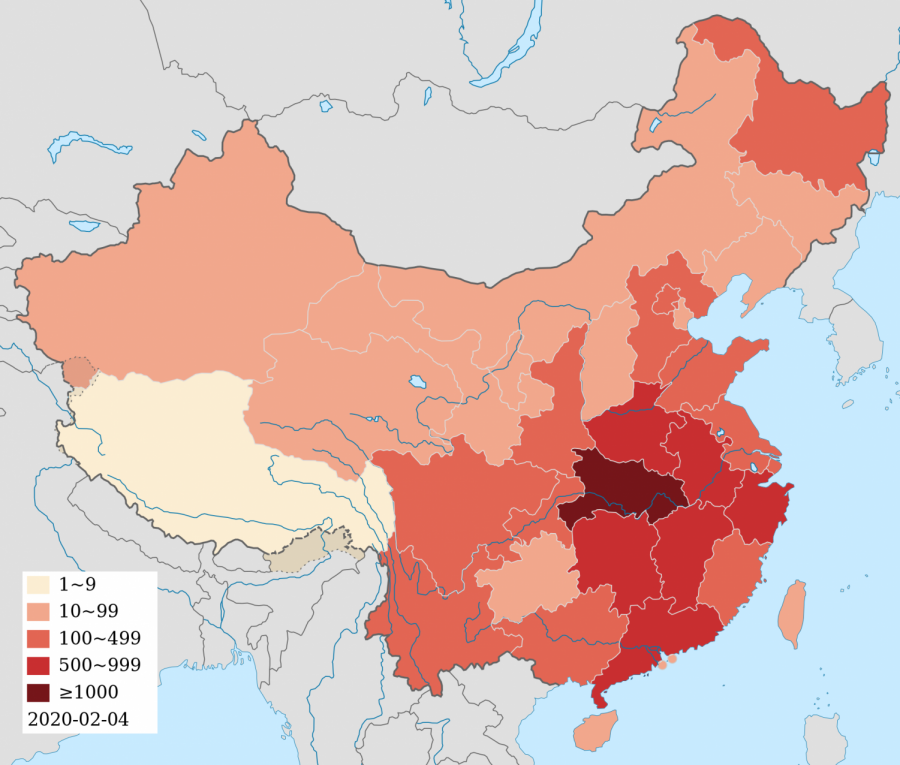Coronavirus Spreads Across Globe
The city of Wuhan in central China is the epicenter of a deadly disease that now encompasses the globe and has now spread to the United States.
Called the Coronavirus, more specifically Novel (new) Coronavirus (2019-nCOV), it was first reported on December 31, 2019 in Wuhan, Hubei province. It is theorized that the disease first was first transmitted at a market selling live animals and seafood. According to the Center for Disease Control (CDC), an investigation to discover more about the outbreak is still underway.
Coronaviruses are in a large viral family, and are often found in animals, most often camels, cattle, cats, and bats. It is rare to have Coronaviruses infect people and then spread person to person, as Novel Coronavirus has.
The outbreak is reminiscent of the Sever Acute Respiratory Syndrome (SARS) and Middle East Respiratory Syndrome (MERS) outbreaks that struck the world in 2003 and 2012, respectively. New SARS cases have not been reported since 2004, but the virus killed 774 people. MERS caused severe acute respiratory disease in over 1,500 people and has resulted in over 500 deaths. To put these outbreaks in context, according to the CDC, the flu and its complications killed an estimated 80,00o Americans during last year’s flu season.
From China, where there are more than 27,000 cases confirmed and more than 500 deaths, the Coronavirus has quickly spread internationally. As of February 3, 2020, there are 146 confirmed cases in 23 countries outside of China. In the United States, 12 cases have been confirmed, in Washington, Illinois, Arizona, Massachusetts, Wisconsin, and California.
The World Health Organization (WHO) has designated an Emergency Committee which deemed the Coronavirus a global emergency. This comes as much is unknown about the virus, as only a couple weeks ago, on January 11, 2020, reports stated the virus was not capable of being transmitting human to human.
Steven Wang ’20 returned from his home in Shanghai, China on January 29 after traveling home on January 21 for Lunar New Year.
After coming back he has started to see how severe the outbreak is from the news cycle, compared to how serious the outbreak was regarded as at the time he and Jack left.
“We started to see how bad this could go, even much worse than the 2003 outbreak of SARS,” Steven said. “[Before we left] we still took precautions and on the way to JFK we asked the driver to stop at Home Depot and we bought around 30 face masks each.”
Asked about the large-scale celebrations that the Chinese government cancelled, Steven remarked how some people were happy because they had more time off for the holiday, while others were anticipating financial struggle because of the lost business opportunities.
“A lot of private businesses have been severely hit,” Steven said.
Steven said he noticed a general tone of frustration with the government when he was home.
“The entire country is blaming the government,” Steven noted, adding that people are scared especially of those from Wuhan. “I heard some restaurants and hotels are refusing Wuhan people. It’s just really kind of sad, and now [the border is] closed they can’t go back to Wuhan.”
Steven mentioned how the Chinese government is set up to handle large scale emergencies like the virus, but was slow in its response.
“People are saying this virus has exposed a lot of weakness in the system,” Steven stated. “The Chinese system is supposed to be really efficient in these kind of emergency situations.”
An example of a shortcoming of the Chinese system was when doctors in Wuhan were arrested for speaking out about the virus in the early stages of the outbreak. Now they have been released and are back working, but their suppression shows how even medical professionals are censored and repressed in the face of emergency.
“There were eight doctors that warned people against this [outbreak], and they were arrested for spreading rumors, and now they are being cleared,” Steven said. “But the Wuhan government ignored all the news.”
On Steven and Jack’s way back, the virus was well known, and people were trying to protect themselves.
“On the way back everyone at the airport was wearing facemasks, and we went through two temperature stations,” Steven described. “There was also a little card to fill out to give to the custom officials stating where you had been and how you were feeling.”
Penn is a three-year senior from New Haven, Connecticut. He enjoys covering campus news and community events, and loves to chat with all members of the...











